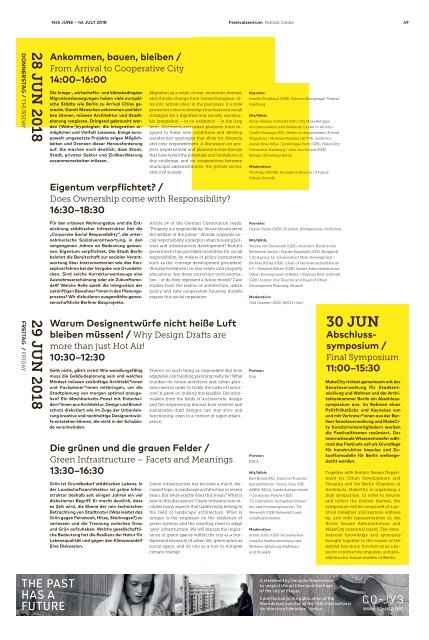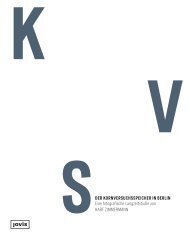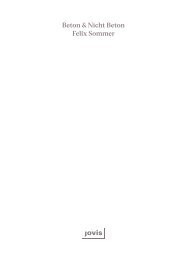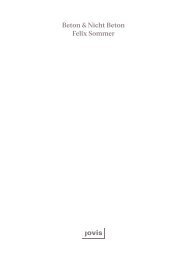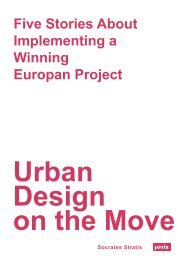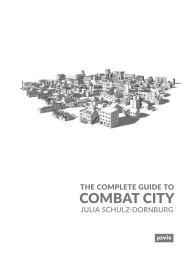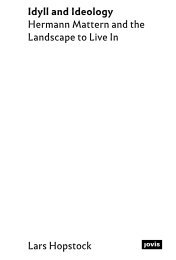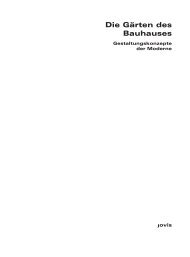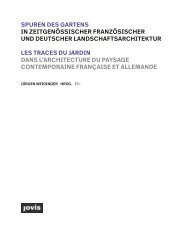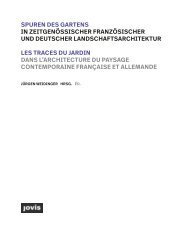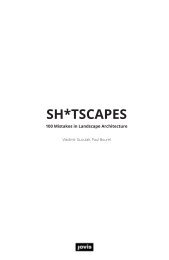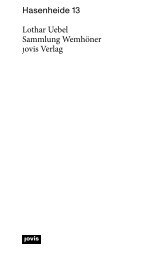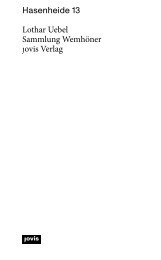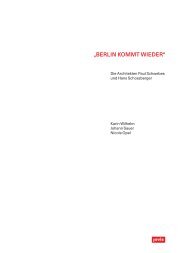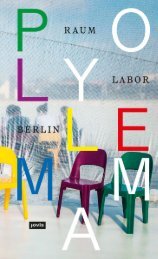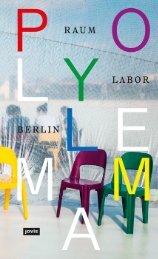Make City 2018 Festival - Newspaper
You also want an ePaper? Increase the reach of your titles
YUMPU automatically turns print PDFs into web optimized ePapers that Google loves.
14th JUNE – 1st JULY <strong>2018</strong><br />
<strong>Festival</strong>zentrum <strong>Festival</strong> Centre<br />
49<br />
DONNERSTAG / THURSDAY<br />
28 JUN <strong>2018</strong><br />
Ankommen, bauen, bleiben /<br />
From Arrival to Cooperative <strong>City</strong><br />
14:00–16:00<br />
Die kriegs-, wirtschafts- und klimabedingten<br />
Migrationsbewegungen haben viele europäische<br />
Städte wie Berlin zu Arrival Cities gemacht.<br />
Damit Menschen ankommen und bleiben<br />
können, müssen Architektur und Stadtplanung<br />
reagieren. Dringend gebraucht werden<br />
(Wohn-)typologien, die Integration ermöglichen<br />
und Vielfalt zulassen. Einige europaweit<br />
umgesetzte Projekte zeigen Möglichkeiten<br />
und Grenzen dieser Herausforderung<br />
auf. Sie machen auch deutlich, dass Staat,<br />
Stadt, privater Sektor und Zivilbevölkerung<br />
zusammenarbeiten müssen.<br />
Migration as a result of war, economic demise,<br />
and climate change have turned European cities<br />
into ‘arrival cities’ in the past years. It is now<br />
pivotal for cities to develop structural and social<br />
strategies for a dignified and socially sustainable<br />
integration – or co-existence – in the long<br />
term. Architects and urban planners must respond<br />
to these new conditions and develop<br />
(residential) typologies that allow for diversity<br />
and civic empowerment. A discussion on projects<br />
implemented and planned across Europe<br />
that have tested the potentials and limitations of<br />
this challenge, and on cooperations between<br />
municipal administrations, the private sector,<br />
and civil society.<br />
Eigentum verpflichtet? /<br />
Does Ownership come with Responsibility?<br />
16:30–18:30<br />
Keynote:<br />
Amelie Deuflhard (GER), Director Kampnagel Theater,<br />
Hamburg<br />
Mit/With:<br />
Pietje-Helene Gottwald (GR), <strong>City</strong> Plaza Refugee<br />
Accommodation and Solidarity Center in Athens /<br />
Cyrille Hanappe (FR), Shelter in displacement (Forced<br />
Migration) / Momoyo Kaijima (JP/CH), Architect,<br />
Atelier Bow-Wow / Dominique Peck (GER), Hafen<strong>City</strong><br />
Universität Hamburg / Julia von Schick (GER),<br />
Refugio Sharehaus Berlin<br />
Moderation:<br />
Tia Korpe (FR/SE), Founder & Director of Future<br />
Female Sounds<br />
Für den urbanen Wohnungsbau und die Entwicklung<br />
städtischer Infrastruktur hat die<br />
„Corporate Social Responsibility”, die unternehmerische<br />
Sozialverantwortung, in den<br />
vergangenen Jahren an Bedeutung gewonnen.<br />
Eigentum verpflichtet. Die Stadt Berlin<br />
belohnt die Bereitschaft zur sozialen Verantwortung<br />
über Instrumentarien wie das Konzeptverfahren<br />
bei der Vergabe von Grundstücken.<br />
Sind solche Korrekturwerkzeuge eine<br />
Ausnahmeerscheinung oder ein Zukunftsmodell?<br />
Welche Rolle spielt die Integration der<br />
zukünftigen Bewohner*innen in den Planungsprozess?<br />
Wir diskutieren ausgewählte genossenschaftliche<br />
Berliner Bauprojekte.<br />
Article 14 of the German Constitution reads:<br />
“Property is a responsibility. Its use should serve<br />
the welfare of the public.” Should corporate social<br />
responsibility underpin urban housing policies<br />
and infrastructure development? Berlin’s<br />
government has provided incentives for social<br />
responsibility, by means of policy instruments<br />
such as the ‘concept development procedure’<br />
(Konzeptverfahren) in real estate and property<br />
allocations. Are these correction tools anomalies<br />
– or do they represent a future model? Case<br />
studies from the realms of architecture, urban<br />
policy and new cooperative housing models<br />
expose this social imperative.<br />
Keynote:<br />
Daniel Dahm (GER), Scientist, Entrepreneur, Performer<br />
Mit/With:<br />
Verena von Beckerath (GER), Architect, Heide & von<br />
Beckerath Studio / Frauke Burgdorff (GER), Burgdorff<br />
<strong>City</strong> Agency for Cooperative Urban Development /<br />
Barbara König (GER), Chair of Genossenschaftsforum<br />
e.V / Manfred Kühne (GER), Senate Administration for<br />
Urban Development of Berlin / Stephan Reiß-Schmidt<br />
(GER) Former <strong>City</strong> Director and Head of Urban<br />
Development Planning, Munich<br />
Moderation:<br />
Olaf Grawert (GER), ARCH+ (tbc)<br />
FREITAG / FRIDAY<br />
29 JUN <strong>2018</strong><br />
Warum Designentwürfe nicht heiße Luft<br />
bleiben müssen! / Why Design Drafts are<br />
more than just Hot Air!<br />
10:30–12:30<br />
Geht nicht, gibt’s nicht! Wie wandlungsfähig<br />
muss die Gebäudeplanung sein und welches<br />
Mindset müssen zukünftige Architekt*innen<br />
und Fachplaner*innen mitbringen, um die<br />
Stadtplanung von morgen optimal anzugehen?<br />
Ein Machbarkeits-Panel mit Entscheidern*innen<br />
aus Architektur, Design und Brandschutz<br />
diskutiert wie im Zuge der Urbanisierung<br />
kreative und nachhaltige Designentwürfe<br />
entstehen können, die nicht in der Schublade<br />
verschwinden.<br />
Die grünen und die grauen Felder /<br />
Green Infrastructure – Facets and Meanings<br />
13:30–16:30<br />
Grün ist Grundbedarf städtischen Lebens. In<br />
der Landschaftsarchitektur ist grüne Infrastruktur<br />
deshalb seit einigen Jahren ein viel<br />
diskutierter Begriff. Er macht deutlich, dass<br />
es Zeit wird, die Ebene der rein technischen<br />
Betrachtung von Stadtnatur (Was leistet das<br />
Grün gegen Feinstaub, Hitze, Starkregen?) zu<br />
verlassen und die Trennung zwischen Grau<br />
und Grün aufzuheben. Welche gesellschaftliche<br />
Bedeutung hat die Resilienz der Natur für<br />
Lebensqualität und gegen den Klimawandel?<br />
Eine Diskussion.<br />
There’s no such thing as impossible! But how<br />
adaptable can building planning really be? What<br />
mindset do future architects and urban planners<br />
need in order to tackle the tasks of tomorrow?<br />
A panel on making this feasible. Decisionmakers<br />
from the fields of architecture, design<br />
and fire engineering discuss how creative and<br />
sustainable draft designs can stay alive and<br />
functioning, even in a context of rapid urbanisation.<br />
Green infrastructure has become a much-discussed<br />
topic in landscape architecture in recent<br />
years. But what exactly does this mean? What is<br />
new in this discussion? Green infrastructure includes<br />
many aspects that traditionally belong to<br />
the field of landscape architecture. What is<br />
unique is the emphasis on the resilience of<br />
green systems and the resulting need to adapt<br />
‘grey’ infrastructure. We will discuss the importance<br />
of green spaces within the city as a fundamental<br />
necessity of urban life; green space as<br />
social space; and its role as a tool to mitigate<br />
climate change.<br />
Partner:<br />
hhp<br />
Partner:<br />
BDLA<br />
Mit/With:<br />
Bart Brand (NL), Director/Founder<br />
karres&brands / Dieter Grau (DE),<br />
AKBW, BDLA, Landschaftsarchitekt<br />
/ Constanze Petrow (GER),<br />
TU Darmstadt, Fachgebiet Entwerfen<br />
und Freiraumplanung / Till<br />
Rehwaldt (GER) Rehwaldt Landschaftsarchitekten<br />
Moderation:<br />
Almut Jirku (GER) Senatsverwaltung<br />
für Stadtentwicklung und<br />
Wohnen Abteilung Städtebau<br />
und Projekte<br />
30 JUN<br />
Abschlusssymposium<br />
/<br />
Final Symposium<br />
11:00–15:30<br />
<strong>Make</strong><strong>City</strong> richtet gemeinsam mit der<br />
Senatsverwaltung für Stadtentwicklung<br />
und Wohnen und der Architektenkammer<br />
Berlin ein Abschlusssymposium<br />
aus. Im Rahmen eines<br />
Politfrühstücks und Keynotes von<br />
und mit Vertreter*innen aus der Berliner<br />
Senatsverwaltung und <strong>Make</strong><strong>City</strong><br />
Kuratoriumsmitgliedern werden<br />
die <strong>Festival</strong>themen resümiert. Der<br />
internationale Wissenstransfer während<br />
des <strong>Festival</strong>s soll als Grundlage<br />
für konstruktive Impulse und Zukunftsmodelle<br />
für Berlin weitergedacht<br />
werden.<br />
Together with Berlin’s Senate Department<br />
for Urban Development and<br />
Housing and the Berlin Chamber of<br />
Architects, <strong>Make</strong><strong>City</strong> is organising a<br />
final symposium. In order to resume<br />
and reflect the festival themes, the<br />
symposium will be comprised of a political<br />
breakfast and keynote address<br />
by, and with representatives of, the<br />
Berlin Senate Administration and<br />
<strong>Make</strong><strong>City</strong> curatorial board. The international<br />
knowledge and synergies<br />
brought together in the course of the<br />
festival functions, function as as a basis<br />
for constructive impulses, and possibilities<br />
for future models of Berlin.


